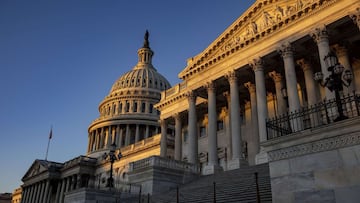$3000 third stimulus check per child: when would it be paid?
A proposal by House Democrats to expand and increase the Child Tax Credit, if passed, could see American families receiving at least $250 per child in July.

On Monday House Democrats are expected to release a 22-page proposal matching similar legislation being crafted in the Senate to create a system of monthly payments based on the Child Tax Credit. The system could see families receiving $300 or $250 checks per month depending on the child’s age for 12 months starting 1 July.
The proposal is a key feature for reducing poverty in President’s Biden’s $1.9 trillion American Rescue Plan that both chambers are working to make a reality in the coming weeks. Democrats have passed budgetary reconciliation bills that will allow them to go it alone without Republican votes, but that doesn’t guarantee the measure will pass.
Expanded and increased Child Tax Credit
The Washington Post was first to publish news on the 22-page plan being spearheaded by Richard Neal, chair of the House Ways and Means Committee. Under the proposal, the Internal Revenue Service would provide over the course of the year $3,000 to each child ages 6 to 17, and $3,600 to each child under the age of 6. That translates to $250 and $300 respectively per month in direct payments to families for 12 months.
As Chairman @RepRichardNeal said, this money is going to be the difference in a roof over someone's head or food on their table.
— Ways & Means Committee (@WaysMeansCmte) February 7, 2021
Families are hurting, and Ways & Means Democrats are working hard to get them the relief they need as fast as possible.https://t.co/0tgZbFLoVA
The plan expands eligibility to lower income families by eliminating the earnings floor in the current tax law whereby a family must earn a minimum of $2500 per year to even qualify for the tax credit when filing their income tax returns. Another advantage for low income families the proposal makes the credit fully refundable for the year.
For higher income families the size of the benefit would phase out for individuals with an adjusted gross income more than $75,000 per year, and for couples jointly earning more than $150,000 per year.
Why will the payments start in July?
Even though the Democrats are moving fast to get a coronavirus relief package the start of the monthly payments would be delayed to give the IRS time to prepare for the new initiative. Democrats are aiming to pass their new spending package before unemployment benefits and other pandemic relief programs run out in mid-March.
Under the current proposal the measure would be temporary, lasting for one year, but there are calls to make the measure permanent. Representatives Rosa DeLauro, Suzan DelBene and Ritchie Torres will also reintroduce the American Family Act as standalone legislation that would continue the expanded benefit permanently.
Now, I’m looking forward to making this change permanent. The first step➡️reintroducing the American Family Act tomorrow with my colleagues @RepDelBene and @RitchieTorres.
— Rosa DeLauro (@rosadelauro) February 7, 2021
How will eligibility for the $3000 cash payments be determined?
Similar to how it sent out stimulus payments last year, the IRS would base eligibility for the payments on families’ income from the previous year. The proposal calls for the creation of an online portal which families would use to update their information as their financial or family situation changes.
To avoid surprises, the legislation creates a “safe harbor” provision, whereby parents who are mistakenly sent the benefit will not be penalized should their family or economic situation change making them ineligible. Because the benefit would be sent out based on a taxpayer's previous income-tax filing they would not be made to pay back the money at the end of the year.
Democrats will try to pass covid-19 relief bill with reconciliation
The Democrats are prepared to go it alone bypassing the need to garner any Republican votes using the budgetary tool known as ‘reconciliation’. The Democrats need to keep their own caucus onboard with the final covid-19 relief bill. They will need all 50 senators to vote in favor of the bill to ensure it passes with Kamala Harris casting the tiebreaking vote. They and the White House would like the Republicans to come along but that doesn’t seem likely.
Although generally opposed to the size of the overall package that Democrats are proposing there was surprise support from Mitt Romney for increasing the Child Tax Credit. However his proposal on Thursday met with criticism from his GOP colleagues who have supported previous expansions of the tax credit. Senators Marco Rubio and Mike Lee, who helped expand the Child Tax Credit in 2017, said in a joint statement “An essential part of being pro-family is being pro-work. Congress should expand the Child Tax Credit without undercutting the responsibility of parents to work to provide for their families.”
Before anyone gets too excited about Mitt Romney's plan for child benefits, note it eliminates Temporary Assistance for Needy Families as well as child tax credit. So hardly clear that poor families and kids come out ahead.
— Robert Reich (@RBReich) February 4, 2021
Romney plan would also call for reducing other programs so that his proposal would not add to the federal deficit. His proposals would be poison pills to Democratic support.
$3000 child benefit could reduce childhood poverty by 50 percent
Related stories
One of the major benefits of increasing and expanding the Child Tax Credit would be a reduction in childhood poverty. Researchers at Columbia University have found that the Biden Plan, the framework for the current proposal, could curb child poverty by as much as 54 percent. Under the current child tax credit “there are 24 million children that are too deep in poverty to benefit from it,” according to Wes Moore of the Robin Hood Foundation.
Third stimulus check: live updates
You can get the latest updates on the proposed third stimulus check, and other mooted aid measures such as the expanded child tax credit, by following our dedicated live blog.


